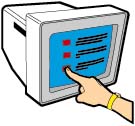Internet Field Trips

Goals:
- Learn about the differences and variety of information in
various nautical and marine museums around the world.
- Comprehension and understanding of various facts about each
museum, its location, and the significance of each.
- Improve computer and Internet skills.
Resources:
Internet addresses for maritime museums around the
world. (Provided at the end of lesson plan).
Materials:
Computer with access to Internet, notebook, pencil
Time:
One hour each day for a week in the computer lab.
Thirty to forty-five minutes each day in the classroom.
Teacher Preparation:
The teacher will need to research various maritime
museum addresses that apply to ships and oceans. The teacher will
then instruct students on information they will need to go on their
Internet field trips.
Procedure:
- Put students in groups of three. Each student will be assigned
a role of either computer operator, note taker, or presenter.
- Assign each group one Internet museum a day. The students will
need to know that a final paragraph presentation for each museum
will be due each day. The paragraphs should include: where they
visited, what country or state does the museum reside, what does
the museum contain, what are the hours and cost, and why would it
be valuable to visit this particular museum. The group will do a
total of five paragraphs for five separate museum field trips.
- The students will access each address and write down any
important information of facts about each museum.
- At end of computer lab session, the students in each group
will go back to the classroom and write up one final paragraph of
their field trip.
Assessment:
Criteria for success: will be based on their handing
in of one final paragraph for each of their field Internet field
trips. Plus, the quality and amount of information the students wrote
on in their paragraphs. The criteria for success will be determined
by self and
group evaluation rubrics, and
writing rubric.
Curricular Strands and Major Concepts:
- Social Studies- content covered of factual information on each
museum’s artifacts and significance to ships and oceans.
- Language Arts-writing down of important factual information
from each field trips.
- Computer- accessing Internet and learning about links on each
maritime museum site.
- Science- researching and analyzing the artifact which are
contained in the Internet nautical and marine museums.
Possible Extensions:
- Students will need to save each final draft of each paragraph
in order to make a final journal of each museum they went to.
Creativity of each journal is up to the students.
Some Internet Maritime Museum addresses
http://www.uss-salem.org/museum/visit.html
http://www.sdmaritime.com/map.html
http://www.cronab.demon.co.uk/pnbm3.htm
http://www.southstseaport.org/orient.htm
http://www.phoenix.net/~tsm/
http://www.aloha.net/~bowfin/
http://www.dataplusnet.com/maritime/vinfo.html
http://www.bathmaine.com
http://www.mariner.org/
http://www.lexicom.ab.ca/~navalmuseum/general.html
Next Lesson
Previous Lesson
Table of Contents
Back to Main Page

